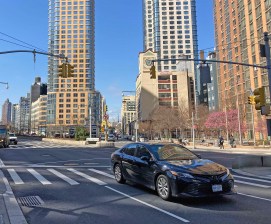What Does It Take to Keep a Reckless New York Driver Off the Road?
We heard the question more than once. When it was reported that Allmir Lekperic, the unlicensed driver who killed Peter and Lillian Sabados as they walked to Thanksgiving Mass on Staten Island last Wednesday evening, had racked up some 29 license suspensions since 2006, Streetsblog readers wondered: How is this guy not behind bars, much less behind the wheel?
The answer, in a nutshell, is that as long as you stay sober and pay your fines, in New York State you can pretty much count not only on avoiding jail time, but retaining your driving privileges with minimal interruption no matter how many times you are ticketed, even if you take a life — a systemic failure that Mayor Bloomberg and NYPD Commissioner Kelly continue to ignore, though the city death count shows no sign of abating.
Let’s start with what it means to have one’s license suspended or revoked. “Suspension simply means you are suspended for a time certain after which you can go to DMV, pay a reinstatement fee, and get your license back,” says Scott Cerbin, a city defense attorney who participated in the October TA/TSTC legal symposium on vehicular violence. “Revocation — which is usually a six month minimum — means that you are revoked for at least a time certain after which you can ask the commissioner to reinstate you.”
According to the DMV, accumulating 11 or more license points within 18 months will trigger either a suspension or revocation, though it’s “usually” just for 31 days. Here is a sampling of singular offenses and their prescribed penalties:
- Aggravated DWI, or DWI with a .18 percent BAC: 1 year revocation
- DWI, or with a .08 percent BAC: 6 month revocation
- Homicide, assault or criminal negligence resulting in death from the operation of a motor vehicle: 6 month minimum revocation
- 3 speeding and/or misdemeanor traffic violations committed within 18 months: 6 month revocation
- Leaving the scene of a fatal or personal injury accident: 6 month revocation
As you can see, even in the rare case where someone dies and the motorist is charged and convicted, driving privileges are not necessarily threatened for a period exceeding six months.
“Currently the law is written to keep people driving, as if driving were
somehow a civil right,” says Kyle Wiswall of the Tri-State Transportation Campaign. “Revisions are needed to better reflect the fact
that driving is a privilege, one that is permanently and irretrievably
revocable when you repeatedly endanger other people.”
Jail time and vehicle forfeiture do not enter the picture unless a driver is either intoxicated or convicted of first or second degree aggravated unlicensed operation (driving with a suspended or revoked license). Imprisonment is not mandatory, however, even for a conviction of first degree AUO, a felony. And Cerbin explains that a habitually dangerous driver can flout the law at will and still keep his or her license “clear.”
“You have to look closer at the suspensions. For example, if a motorist receives, say, six tickets at once — speeding, fail to signal, unlicensed, uninsured, no seat belt, and cell phone — and fails to appear at DMV he will have six suspensions. Additionally, the amount of points generated by these tickets may generate a seventh suspension. He cannot be arrested for 511 [driving without a license] unless he is actually stopped while driving on the suspensions.
“In the Staten Island case, it is unclear how many active suspensions existed. For example, let’s assume our guy had seven. He could go into DMV, pay the fines, show proof that he had insurance, and have his license reinstated. Note that the judge there could make a deal and drop some of the tickets in exchange for a plea on one [or] some of the charges. If this happened on a regular basis one could have had 29 suspensions over four years.”
The DMV says applications may be denied for those with poor driving records — which you’d think would be the case with many who have had their licenses revoked. I asked Cerbin what a driver would have to do in New York State to lose his license permanently. “I have represented clients who have had multiple felony DWI cases and are revoked for one year,” he said. “However, it is unlikely that the commissioner will ever relicense these individuals.”
So, at least for some drivers who persist in putting lives at risk, the revolving door eventually stops spinning. That’s little consolation when every day more innocent victims are hurt and killed by motorists whose deadly behavior is not fueled by alcohol.
Says Wiswall: “Endangering others means not only DUI, but high risk behavior like speeding, driving while distracted and failing to signal — violations now accepted in practice as norms on the road, harmless things people always do and occasionally get ‘busted’ for.”

